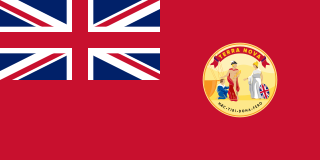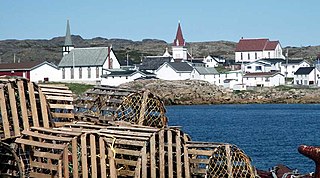The 7th Newfoundland general election was held in 1855 to elect members of the 6th General Assembly of Newfoundland. This was the first election after responsible government was introduced to the Dominion of Newfoundland. [1] The Liberal Party led by Philip Francis Little formed the government.

The members of the 6th General Assembly of Newfoundland were elected in the Newfoundland general election held in May 1855. The general assembly sat from 1855 to 1859.
Responsible government is a conception of a system of government that embodies the principle of parliamentary accountability, the foundation of the Westminster system of parliamentary democracy. Governments in Westminster democracies are responsible to parliament rather than to the monarch, or, in a colonial context, to the imperial government, and in a republican context, to the president, either in full or in part. If the parliament is bicameral, then the government is responsible first to the parliament's lower house, which is more representative than the upper house, as it has more members and they are always directly elected.

Newfoundland was a British dominion from 1907 to 1949. The dominion, situated in northeastern North America along the Atlantic coast, comprised the island of Newfoundland as well as Labrador on the continental mainland. Before attaining dominion status, Newfoundland was a British colony, self-governing from 1855.
- Fogo
- William Henry Ellis Conservative
- William Whiteway Conservative, elected in 1858 [2]
- Thomas Knight Conservative
- William Henry Ellis Conservative
- Bonavista Bay
- Robert Carter Conservative
- John H. Warren Conservative
- Matthew W. Walbank Conservative
Robert Carter was a Newfoundland naval officer and political figure.
John Henry Warren was an English-born merchant and politician in Newfoundland. He represented Bonavista Bay from 1852 to 1869 and from 1874 to 1878 and Trinity Bay from 1871 to 1874 in the Newfoundland and Labrador House of Assembly.
Matthew William Walbank was an English-born lawyer and political figure in Newfoundland. He represented Bonavista Bay in the Newfoundland and Labrador House of Assembly from 1855 to 1859 and from 1861 to 1865.
- Trinity Bay
- Stephen March Conservative
- John Winter Conservative
- F.B.T. Carter Conservative
Stephen March was a merchant and politician in Newfoundland. He served in the Newfoundland House of Assembly from 1852 to 1869.
John Winter was an English-born physician and political figure in Newfoundland. He represented Trinity Bay in the Newfoundland and Labrador House of Assembly from 1855 to 1865.

Sir Frederick Bowker Terrington Carter, was a lawyer and Premier of Newfoundland from 1865 to 1870 and from 1874 to 1878.
- Bay de Verde
- John Bemister Conservative
- Carbonear
- Edmund Hanrahan Liberal
- Harbour Grace
- James L. Prendergast Liberal
- John Hayward Conservative
James Luke Prendergast was a merchant and political figure in Newfoundland. He represented Conception Bay from 1842 to 1852 and Harbour Grace from 1855 to 1859 and from 1860 to 1861 in the Newfoundland and Labrador House of Assembly as a Liberal.
John Hayward was a lawyer, judge and politician in Newfoundland. He served in the Newfoundland House of Assembly from 1852 to 1866.
- Brigus-Port de Grave
- Robert Brown Conservative
- St. John's East
- John Kent Liberal
- Robert J. Parsons Liberal
- Peter Winser Liberal
- John Kavanagh Liberal, elected in 1857 [2]
- St. John's West
- John Fox Liberal
- John Casey Liberal, elected in 1857 [2]
- Ambrose Shea Liberal (speaker)
- P.F. Little Liberal
- J. J. Gearin, elected in 1858 [2]
- John Fox Liberal
- Harbour Main
- Thomas Byrne Liberal
- William Talbot Liberal
- Ferryland
- Thomas Glen Conservative
- Edward D. Shea Liberal
- Placentia and St. Mary's
- George J. Hogsett Liberal
- Michael John Kelly Liberal
- John Delaney Liberal
- Burin
- Clement Benning Liberal
- Patrick Morris Liberal
- Fortune Bay
- Hugh W. Hoyles Conservative
- Burgeo-LaPoile
- Robert Henry Prowse Conservative [2]

Fogo is an outport community on Fogo Island in the Canadian province of Newfoundland and Labrador. It was previously incorporated as a town prior to becoming part of the Town of Fogo Island through an amalgamation in 2011.
William Henry Ellis was an English-born politician in Newfoundland. He represented Fogo in the Newfoundland and Labrador House of Assembly from 1855 to 1858.

Sir William Vallance Whiteway, was a politician and three time Premier of Newfoundland.




